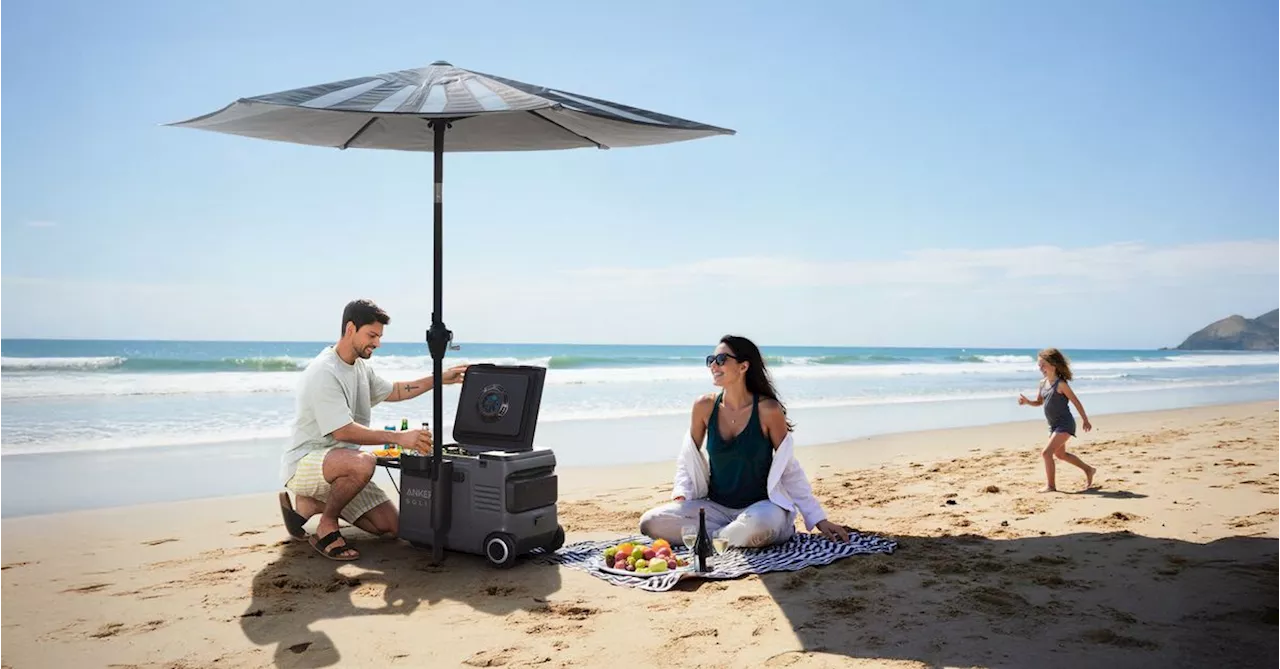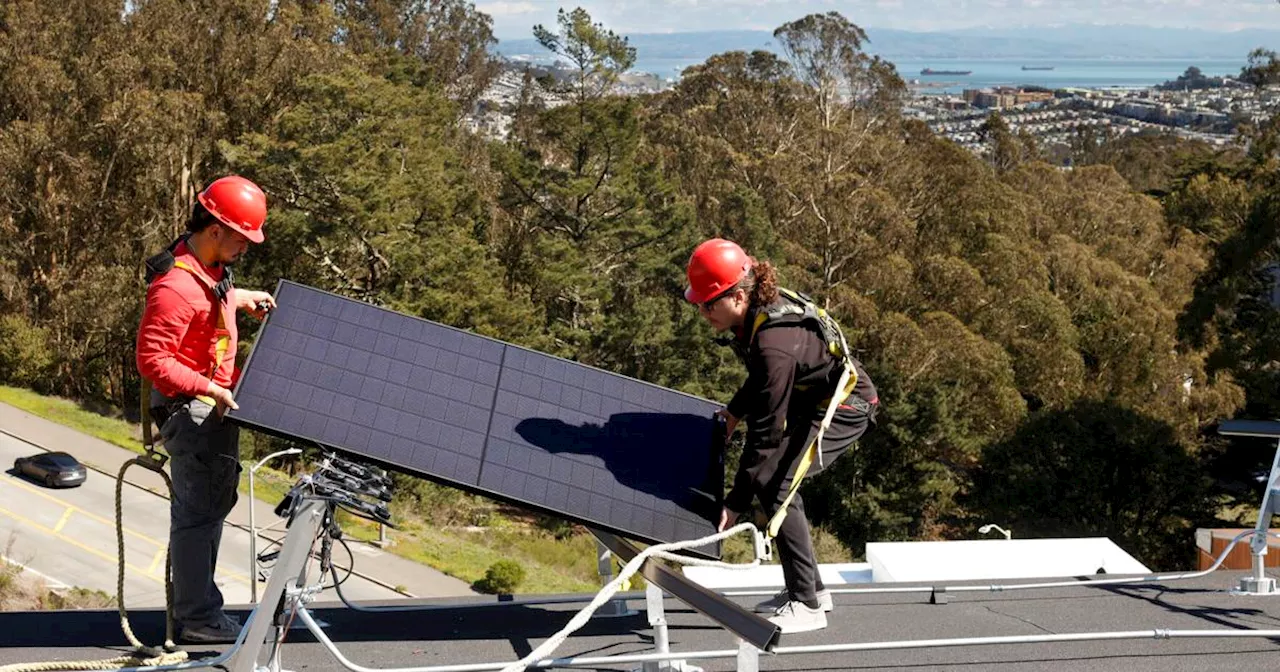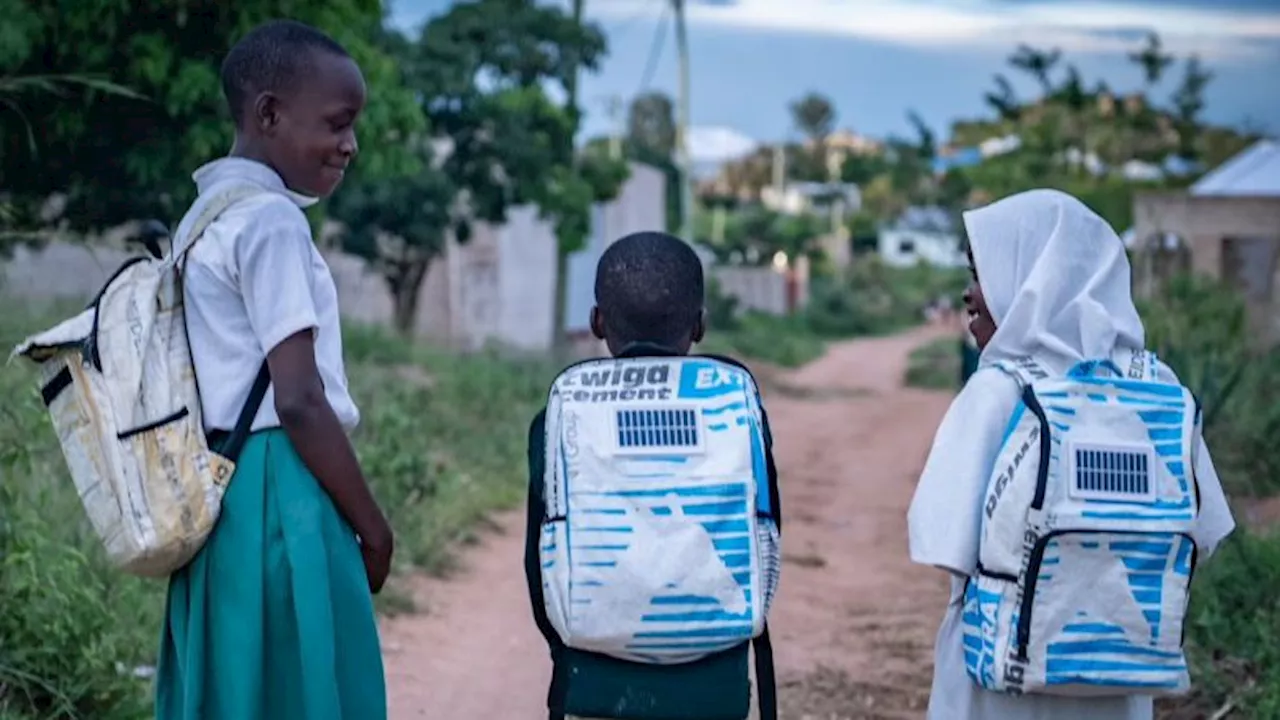Soma Bags, founded by Innocent James, provides solar-powered backpacks to children in rural Tanzania, enabling them to read after dark. The backpacks, made from repurposed cement bags, have become a popular solution for families facing the challenge of limited electricity access.
When Innocent James completed his chores after school, he would light a kerosene lamp and lay down to read his books. There was no electricity in James’ part of Arusha, a region in northern Tanzania , and so his family was forced to burn expensive oil for him to learn after dark. Today, James is 33, and many parents in rural Tanzania – where all year round the sun sets at around 7pm – must still choose between saving money and allowing their children to read at night.
But now, James’ company, Soma Bags, is providing a solution: backpacks equipped with solar panels that charge a reading light. What started as a small-scale project with some discarded cement bags, a sewing machine, and a solar panel, has become a business attracting charities and fashion brands from around the world. Last year, Soma Bags (“Reading Bags” in Swahili) sold 36,000 solar backpacks to people across Africa, providing an invaluable energy source for when the sun goes down. Affordable light for rural households James was brought up by his mother and grandmother, both schoolteachers, to love reading. At university in Mwanza, James was shocked at the number of schoolchildren he noticed on the street skipping class to ask for money, largely to spend in local video game cafés. He wanted to help them find the taste for learning that he remembered from his childhood. “I was frustrated,” James said, “I could see that the problem was much, much bigger than I thought.” Before his last semester, James dropped out of university and used the last of his tuition money to buy a mobile library cart. He began visiting schools, attracting hundreds of children to his reading clubs. But for all his hard work, there was a problem: children would borrow books from him and then return them unread. James soon realized that while they were eager to read, they could not afford to do so. Fewer than half of households in mainland Tanzania are connected to electricity. This falls to just over a third in rural areas. Consequently, many families rely on kerosene lamps to provide light after dark. These lamps produce dim light and are expensive to fill. They also pollute the air and carry the risk of burns. Parents often opt to send their children to bed, James explained, rather than allowing them to use the lamp to read. James’ solution – flexible solar panels sewn onto the outside of bags to power a reading light – was inspired by a university professor who carried around a solar charger for his phone, sewn into a fabric pouch. “It gave me the confidence that what I want is going to work,” said James. He started in 2016 by handmaking 80 backpacks per month, sewing on a solar panel sourced from China that charged during the children’s walk to and from school. By the time they returned home, they would have enough power for a reading light. A fully charged bag can power a light for six to eight hours, meaning that one day of bright weather can allow for multiple nights of reading, even if cloudy weather arrives. James says the solar backpacks are more affordable than using an oil lamp. A solar bag costs between 12,000 and 22,500 Tanzanian shillings (approximately $4-8), with the reading light included – the same price as 12-22.5 days of using a kerosene lamp, according to an average cost estimated in a survey of Soma Bags customers. Building the business Sold mainly from his growing franchise of mobile library carts, the bags became popular, and James increased production. He founded Soma Bags in 2019 and oversaw the construction of his own factory in the village of Bulale, in the Mwanza region, in 2020. The company now employs 65 staff. Made from repurposed cement bags found on the streets of Mwanza, where James lives, the backpack material is durable, lightweight, zero waste, and comes at no cost. The backpacks look good, too – in the middle of the bags, the white silhouette of a giraffe appears within bright yellow or green stripes. “It’s innovative,” said Joseph Manirakiza, of the UN Development Programme (UNDP), which has supported Soma Bags since 2023. “I never thought someone would think of turning waste cement bags into something useful.” James’ customers are, in the main, families and schools in rural Tanzania – people and institutions with whom he is familiar from his library cart days. But the company is expanding; over 200 charities have bought bags from James to distribute amongst children in need, and Soma Bags is becoming increasingly popular in urban areas. While inside Soma’s smaller backpacks are battery-powered reading lights, its bigger bags now have in-built charging systems with a greater capacity, enabling them to power other electronic devices, like phone chargers. The company has also branched out into travel, sports, and cosmetic bags that aren’t solar-powered. James has sold backpacks to charities in Nigeria, Rwanda, Madagascar, and the Democratic Republic of Congo, and to fashion brands in Poland, Germany, the Netherlands and Keny
Solar Energy Education Sustainability Rural Development Tanzania
United States Latest News, United States Headlines
Similar News:You can also read news stories similar to this one that we have collected from other news sources.
 Solar Cycle 25: Peeking into the Future of Solar ActivityThis article delves into the current state of Solar Cycle 25, highlighting its heightened activity and the implications for future solar events. It explores recent notable solar events like the 2024 total solar eclipse and geomagnetic storms, emphasizing the ongoing increase in solar activity. While the precise peak of Solar Cycle 25 remains uncertain, it's confirmed that its activity surpasses that of the previous cycle.
Solar Cycle 25: Peeking into the Future of Solar ActivityThis article delves into the current state of Solar Cycle 25, highlighting its heightened activity and the implications for future solar events. It explores recent notable solar events like the 2024 total solar eclipse and geomagnetic storms, emphasizing the ongoing increase in solar activity. While the precise peak of Solar Cycle 25 remains uncertain, it's confirmed that its activity surpasses that of the previous cycle.
Read more »
 Anker's Solix Solar Beach Umbrella harnesses Perovskite Solar TechAnker's new Solix Solar Beach Umbrella features a perovskite solar cell technology that promises higher efficiency and lower costs compared to traditional silicon-based cells. The umbrella can generate up to 100W of power, enough to keep Anker's Solix EverFrost 2 Electric Cooler running indefinitely in sunny conditions.
Anker's Solix Solar Beach Umbrella harnesses Perovskite Solar TechAnker's new Solix Solar Beach Umbrella features a perovskite solar cell technology that promises higher efficiency and lower costs compared to traditional silicon-based cells. The umbrella can generate up to 100W of power, enough to keep Anker's Solix EverFrost 2 Electric Cooler running indefinitely in sunny conditions.
Read more »
 Jackery’s Solar Roof announced alongside new solar generator at CES 2025Jackery’s Solar Roof features curved tiles in terra-cotta red or black with a 25 percent conversion efficiency, while its DC-DC car charger outputs 600W.
Jackery’s Solar Roof announced alongside new solar generator at CES 2025Jackery’s Solar Roof features curved tiles in terra-cotta red or black with a 25 percent conversion efficiency, while its DC-DC car charger outputs 600W.
Read more »
 Jackery Unveils Solar Roof Tiles, New Solar Generators at CES 2025Jackery is showcasing its latest innovations in home energy solutions and portable power at CES 2025.
Jackery Unveils Solar Roof Tiles, New Solar Generators at CES 2025Jackery is showcasing its latest innovations in home energy solutions and portable power at CES 2025.
Read more »
 San Francisco Solar Company Aurora Solar Lays Off 58 WorkersAurora Solar, a San Francisco-based solar energy software company, has laid off 58 employees, marking the second round of job cuts in a year. The company cited 'ongoing macroeconomic challenges and continued uncertainty in the solar industry' as reasons for the layoffs. Aurora plans to refocus its business in response to the current market conditions.
San Francisco Solar Company Aurora Solar Lays Off 58 WorkersAurora Solar, a San Francisco-based solar energy software company, has laid off 58 employees, marking the second round of job cuts in a year. The company cited 'ongoing macroeconomic challenges and continued uncertainty in the solar industry' as reasons for the layoffs. Aurora plans to refocus its business in response to the current market conditions.
Read more »
 Solar Storms to Bring Northern Lights to North AmericaTwo bursts of plasma expelled by the sun are headed towards Earth, promising a spectacular display of the Northern Lights across North America this week.
Solar Storms to Bring Northern Lights to North AmericaTwo bursts of plasma expelled by the sun are headed towards Earth, promising a spectacular display of the Northern Lights across North America this week.
Read more »
